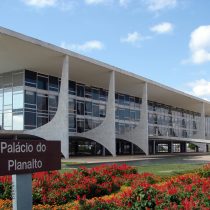
Much has been said, inside and outside Brazil, of the hecatombe that the country has suffered since the beginning of the pandemic. Recently, Brazil was considered the country with the worst response to the SARS-CoV-2 health crisis in the world, according to the Lowy Institute in Australia. And in recent weeks, the Director-General of the World Health Organization (WHO) came to state that the pandemic situation in Brazil is a threat to Latin America and the world.
Brazil in the antipodes of its foreign policy
Brazil is today one of the countries with the most restrictions abroad for travelers. It could not be different, taking into account the constant and uneedited violation of the right to life and health of Brazilians, directly promoted by the Federal Government and its representatives.
The smokescreen raised through the fake news and hate war that has settled in the country since the last election of 2018, powers a tangle of information of different facts and versions. In this scenario, the performance of President Jair Bolsonaro, currently without a party, often aims to mask the real situation, shifting the focus away from the mismanagement of the Federal Executive, especially the Ministry of Health, in the fight against the pandemic.
In retrospect, the sum of acts against public health during the pandemic reflects a movement consistently contrary to the country’s proposed history, both in the context of health policies and in international cooperation agreements in the area. It is regrettable that, even having one of the largest public and universal health systems (SUS) in the world, former Health Minister Eduardo Pazuello said that, before taking office, he “didn’t even know what the SUS was.”
Political ideologies aside, nothing that happens today in Brazil represents the history of the country’s action in the field of health, nor in foreign policy.
Apogee and crisis of Brazilian diplomacy in health
For most of its Republican history, Brazilian diplomacy was guided by autonomy and pragmatism, paradigms abandoned by the current government. The governments of Fernando Henrique Cardoso (PSDB), for example, expanded international associations and participation in various global forums. Some initiatives, many of them led by then-Health Minister José Serra, reinforced an innovative policy of access to HIV/AIDS medicines by associating health with the concept of fundamental human law.
Within the World Trade Organization (WTO), the 2001 Doha Declaration on TRIPS (Agreement on Aspects of Intellectual Property Rights) and Public Health is an example of Brazil’s prominence in proposing the interministerial meeting that enabled international intellectual property agreements to be interpreted in the public interest. This defended the primacy of health over international trade rules.
Following the reduction in costs of antiretroviral drugs, Brazil first decreed, in 2007, the patent rupture of a foreign drug. The then President Lula da Silva and the Minister of Health, José Gomes Temporoo, began the process with the publication of an ordinance, declaring the drug Efavirenz, from the US laboratory Merck, in the public interest. The governments of the PT of Lula and Dilma Rousseff promoted Brazil’s international action on the health agenda, which was largely based on strengthening cooperation between the countries of the so-called Global South.
In 2011, BRICS promoted a meeting of its health ministers in China, which aimed to allow universal access to medicines. On that occasion, technology transfer between bloc members and other developing countries was approved to increase the production capacity of affordable medicines.
For Brazil, one of the largest importers of hospital and laboratory supplies in China and India, continuing cooperation policies and trade alliances of yesteryear would maximize short-term political, economic and social benefits, especially during the pandemic.
However, the current Brazilian Chancellor, Ernesto Araújo, insists on the theory of “Chinese virus” as a form of domination of other countries, in addition to publicly attacking WHO, a body in which Brazil has already held one of the 34 positions of the Executive Board between 2004 and 2007, having been re-elected for another three years, between 2008 and 2011. These actions had no effect other than further delaying the shipment of new vaccines to Brazil.
Defending health as a fundamental human right
A look back gives us a sense of dystopia. By presenting himself to the world with a denialist message, which disqualifies science, disseminates false information and institutionally promotes the increase in the number of deaths by not fighting the pandemic, Brazil loses, in addition to lives, international status in the area of health.
With this stance, the opportunity to articulate in bulk is also lost so that the countries of the Global South receive more doses, as China, India and Russia have already developed their own vaccines, in addition to the United States and the United Kingdom. According to figures published in January by WHO, for every 39 million doses of covid-19 vaccines spread across 49 developed countries, a poor country receives only 25 doses.
Equality in immunization is a basic assumption to end the pandemic. However, after decades of renowned vaccination programs in Brazil, President Bolsonaro publicly states that covid-19 will not be vaccinated and encourages the population to do the same, alluding to possible side effects.
The consequences don’t end there. While the country was awarded internationally for its reference social programs in the fight against hunger, Brazil has taken a step back. By 2021, after the end of emergency aid, Brazil will have more than 60 million people below the poverty line.
It is necessary to combat the Institutionalized Propaganda of the Federal Government contrary to current health practices, the dissemination of false or scientifically un proven news, and repeated anti-public health acts, including those restricting or delaying the responses of state and municipal governments to the pandemic.
The political mobilization and, above all, of society around health as a fundamental human right remains crucial in consolidating past achievements. Further setbacks must be avoided and immediate progress promoted in the context of the greatest health crisis of the century.
*Professor at the School of Political Science of the Federal University of the State of Rio de Janeiro (UNIRIO). Doctor of Political Science (Iesp-Uerj). He has experience in the area of Political Science and International Relations, with an emphasis on Brazil and Latin America.
PhD in Politics and International Relations at the “Centro de Pesquisa e Documenta’o de História Contempor’nea do Brasil” (CPDOC) of the Getúlio Vargas Foundation (FGV).
www.latinoamerica21.com, a plural medium committed to the dissemination of critical and truthful information about Latin America.
The content poured into this opinion column is the sole responsibility of its author, and does not necessarily reflect the editorial line or position of El Mostrador.





